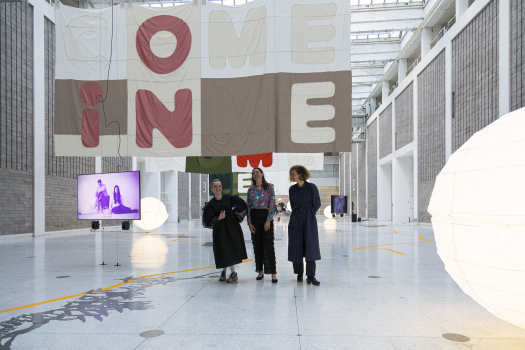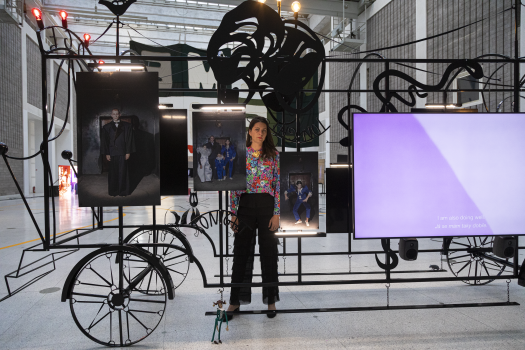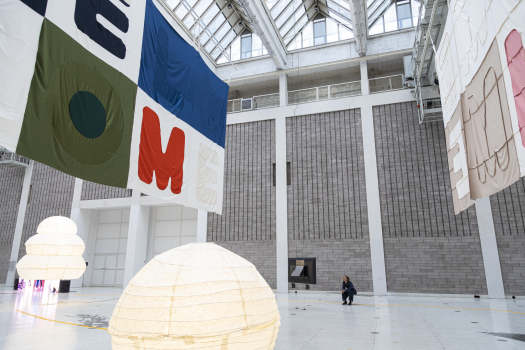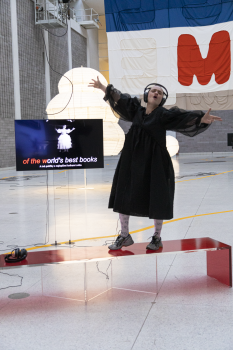MOVE
Intimacy as Resistance
National Gallery Prague
This year’s edition of the MOVE festival organised since 2017 at Centre Pompidou in Paris, and presented for the first time in Prague, explores the theme of intimacy and its exhibition. In the late 1960s, based on the principle that the personal is political, female artists often used their own private lives in their work, notably through the mediums of video and photography: their domestic interiors, their own bodies, their romantic relationships and their sexuality. Intimacy was downplayed in patriarchal society, relegated to the domain of private practices, which were considered to be the polar opposite of universal and fundamental subjects. Feminist theories at the time viewed the disclosure of women's everyday experience as a means of exposing the mechanisms of domination and developing a form of collective consciousness. In this respect, intimacy prompts a consideration of the minority.
Laying claim to a space that is still scorned and undervalued, contemporary art continues this history by exploring the resistance potential of working with intimacy. And in a very different context: in the 21st century, many controversies have focussed on the increasing narcissistic exhibition of our private lives through social networks, which is referred to as extimacy. What was supposed to remain hidden, internal, is now freely accessible and exhibited without regard for risks of surveillance exercised by the State or private companies. This articulation between forced or unconscious transparency, exhibition and political assertion and the importance of links and communities thus poses the question of the use of the intimate as an act of resistance.
In the wake of the pandemic that had such a dramatic impact on the world in 2020, these questions are also posed from a new standpoint. Lockdowns and forced domestic seclusion established new connections between the personal and professional spheres while drastically reducing human contact. This loss generated serious distress and revealed the degree to which this need is essential to human life.
The question of intimacy is also explored here through the links and correspondences that artists can have between them, or can weave through their works.
Represented artists:
Julie Béna
Julien Creuzet
Mélanie Matranga
Marijke De Roover
Rory Pilgrim
Hannah Quinlan
Rosie Hastings
Mona Varichon
Curator and author of conception: Caroline Ferreira, head of Manifestations arts et société Center Pompidou
Curator (NGP): Michal Novotný, director of the Collection of Modern and Contemporary Art of the National Gallery Prague
Intimacy as Resistance
National Gallery Prague
This year’s edition of the MOVE festival organised since 2017 at Centre Pompidou in Paris, and presented for the first time in Prague, explores the theme of intimacy and its exhibition. In the late 1960s, based on the principle that the personal is political, female artists often used their own private lives in their work, notably through the mediums of video and photography: their domestic interiors, their own bodies, their romantic relationships and their sexuality. Intimacy was downplayed in patriarchal society, relegated to the domain of private practices, which were considered to be the polar opposite of universal and fundamental subjects. Feminist theories at the time viewed the disclosure of women's everyday experience as a means of exposing the mechanisms of domination and developing a form of collective consciousness. In this respect, intimacy prompts a consideration of the minority.
Laying claim to a space that is still scorned and undervalued, contemporary art continues this history by exploring the resistance potential of working with intimacy. And in a very different context: in the 21st century, many controversies have focussed on the increasing narcissistic exhibition of our private lives through social networks, which is referred to as extimacy. What was supposed to remain hidden, internal, is now freely accessible and exhibited without regard for risks of surveillance exercised by the State or private companies. This articulation between forced or unconscious transparency, exhibition and political assertion and the importance of links and communities thus poses the question of the use of the intimate as an act of resistance.
In the wake of the pandemic that had such a dramatic impact on the world in 2020, these questions are also posed from a new standpoint. Lockdowns and forced domestic seclusion established new connections between the personal and professional spheres while drastically reducing human contact. This loss generated serious distress and revealed the degree to which this need is essential to human life.
The question of intimacy is also explored here through the links and correspondences that artists can have between them, or can weave through their works.
Represented artists:
Julie Béna
Julien Creuzet
Mélanie Matranga
Marijke De Roover
Rory Pilgrim
Hannah Quinlan
Rosie Hastings
Mona Varichon
Curator and author of conception: Caroline Ferreira, head of Manifestations arts et société Center Pompidou
Curator (NGP): Michal Novotný, director of the Collection of Modern and Contemporary Art of the National Gallery Prague
1—1 / 4














